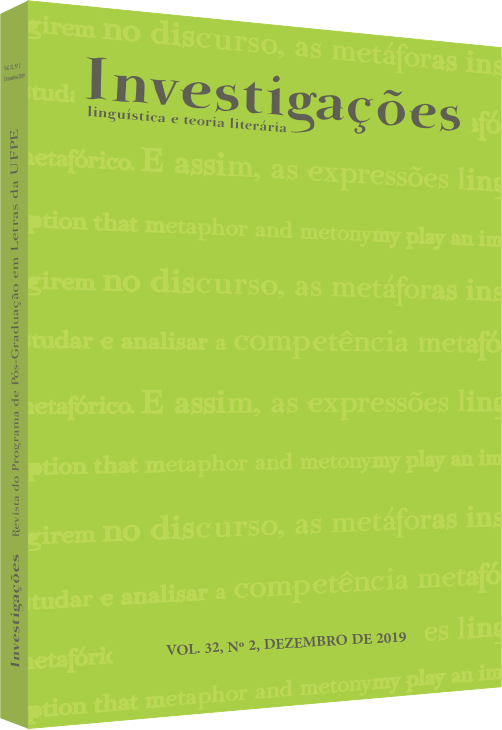Bacanal narcisista no Louvre: racismo e poder através da adjetivação em um post de Sheila Leirner no jornal Estadão
DOI:
https://doi.org/10.51359/2175-294x.2019.241767Keywords:
discourse, race, power, adjectives.Abstract
Using the "global organizers of ideologically based discourses" proposed by Teun A. van Dijk, this article discursively analyzes a post authored by Sheila Leiner in her blog, hosted at the Culture section of the newspaper Estadão. The research takes the use of adjectives as a linguistic clue to understand the discursive purpose of the mentioned post, which is a negative critique of a music video where black culture is exalted and presented as intellectual capital. Thus, it demonstrates the way in which language is employed in the attempt to maintain power relations through discourse(s).References
ALMEIDA, Silvio. O que é racismo estrutural? Belo Horizonte: Letramento, 2018.
BERTH, Joice. O que é empoderamento? Belo Horizonte: Letramento, 2018.
BLACKLEDGE, Adrian. Discourse and power. In: GEE, J. P.; HANDFORD, M. (Eds.). The Routledge Handbook of Discourse Analysis. New York: Routledge, 2012.
BORBA, Francisco da Silva. Dicionário Unesp do português contemporâneo. São Paulo: Unesp, 2005.
BOURDIEU, Pierre. O poder simbólico. Rio de Janeiro: Bertrand Brasil, 1989.
CARMO, Cláudio Márcio do. Do texto ao ideológico: uma análise de algun elementos textuais do discurso da Igreja Universal do Reino de Deus na mídia televisiva. Tópicos de Linguagem: Revista de estudos de lingüística e literatura, Barbacena: s.n, v.1, n.2, p. 111-132, nov. 2006.
FAIRCLOUGH, Norman. Discurso e mudança social. Brasília: UnB, 2001.
GIDDENS, Anthony. A constituição da sociedade. São Paulo: Martins Fontes, 2003.
LYSARDO-DIAS, Dylia. Configuração enunciativa de perfis biográficos. In: ASSUNÇÃO, Antônio Luiz; BIAVATI, Nádia Dolores Fernandes; SPERANDIO, Natália Elvira (Org.). Interfaces do linguístico: enunciação e práticas discursivas. Campinas: Pontes Editores, 2017.
MARTÍ, Silas. Jay-Z e Beyoncé se afirmam não só entre elites financeiras, mas também culturais. Folha de São Paulo. Disponível em: <https://www1.folha.uol.com.br/ilustrada/2018/06/jay-z-e-beyonce-se-afirmam-nao-so-entre-elites-financeiras-mas-tambem-culturais.shtml> Acesso em 14 de novembro de 2018.
MARX, Karl; ENGELS, Friedrich. Manifesto comunista. São Paulo: Boitempo, 1998.
MENEZES, Hélio. In: LIMA, Juliana Domingos de. Como Beyoncé e Jay-Z dialogam com a história da arte no clipe de ‘Apeshit’. Nexo Jornal. Disponível em: <https://www.nexojornal.com.br/expresso/2018/06/18/Como-Beyonc%C3%A9-e-Jay-Z-dialogam-com-a-hist%C3%B3ria-da-arte-no-clipe-de-%E2%80%98Apeshit%E2%80%99> Acesso em 14 de novembro de 2018.
RIBEIRO, Djamila. O que é lugar de fala? Belo Horizonte: Letramento, 2017.
SANTOS, José Luiz dos. O que é cultura. São Paulo: Brasiliense, 1983, paginação irregular.
SANTOS, Regina dos. Reflexões sobre o racismo no contexto da mídia e das concessões dos meios de comunicação no Brasil. In: Racismos contemporâneos. Rio de Janeiro: Takano, 2003.
TYLOR, Edward Burnett. A ciência da cultura. In: Evolucionismo cultural: textos de Morgan, Tylor e Frazer. Rio de janeiro: Jorge Zahar, 2005.
VAN DIJK, Teun A. Discurso e poder. São Paulo: Contexto, 2008a.
VAN DIJK, Teun A. Racismo e discurso na América Latina. São Paulo: Contexto, 2008b.
Downloads
Published
How to Cite
Issue
Section
License
Copyright (c) 2019 Felipe de Souza Oliveira

This work is licensed under a Creative Commons Attribution 4.0 International License.
Authors who publish with Revista Investigações agree to the following terms:
Authors retain copyright and grant the journal right of first publication with the work simultaneously licensed under the Creative Commons Attribution 4.0 International (CC BY 4.0) license that allows others to share the work with an acknowledgement of the work's authorship and initial publication in this journal.
Authors are able to enter into separate, additional contractual arrangements for the non-exclusive distribution of the journal's published version of the work (e.g., post it to an institutional repository or publish it in a book), with an acknowledgement of its initial publication in this journal.
You are free to:
Share — copy and redistribute the material in any medium or format for any purpose, even commercially.
Adapt — remix, transform, and build upon the material for any purpose, even commercially.
The licensor cannot revoke these freedoms as long as you follow the license terms.
Under the following terms:
Attribution — You must give appropriate credit , provide a link to the license, and indicate if changes were made . You may do so in any reasonable manner, but not in any way that suggests the licensor endorses you or your use.
No additional restrictions — You may not apply legal terms or technological measures that legally restrict others from doing anything the license permits.

